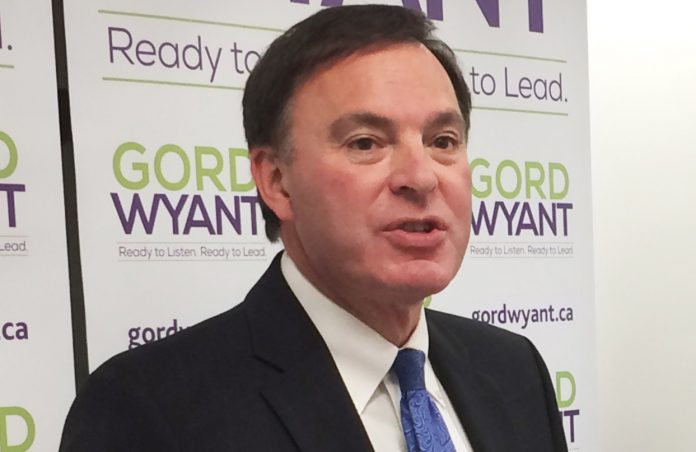It wasn’t long ago that Gord Wyant gave up his federal Liberal membership.
Now, he’s vowing to take a hard line against Ottawa if he becomes premier.
One of five in the running to lead the Saskatchewan Party, the former justice minister called equalization a “fundamentally flawed system” and said federal hesitations over pipelines could “threaten the unity of this country.”
In a Wednesday press release, Wyant said he’ll challenge the federal equalization system, which is intended to even out the tax base among Canadian provinces by transferring billions to provinces considered “have-nots.” But the whole thing relies on a formula, which Wyant said he’ll push to change when it comes up for renegotiation in 2019.
He said Saskatchewan’s oil and gas revenues, which help throw us into the category of a “have” province, should be exempted – just like non-renewables.
“Provinces like Manitoba and Quebec have significant hydro resources, and those hydro resources aren’t counted,” Wyant said. “When equalization is paid by a province like Saskatchewan they are, in effect, underwriting the utility cost of people who live in those provinces.
“I think that there’s a fundamental unfairness about that,” he said. “My government would take a very strong line on renegotiating that program to make sure it’s fair for everyone in this country.”
Wyant said he’s aware of the opposition his proposal would meet with, especially from the six current have-not provinces, which stand to lose the most from any changes. But he said he wants to push as hard as he can if elected leader, and is prepared to re-initiate a lawsuit to challenge the current formula in court.
“I’m under no illusions that other provinces who are beneficiaries of equalization, particularly Québec, are going to jump in and say, ‘yeah, let’s renegotiate because it’s unfair to Saskatchewan and Alberta,” he said. “I suspect we are going to have a very strenuous argument on our hands.
“But as a government we need to stand up.”
Wyant went as far as castigating Québec for helping block the Energy East pipeline, arguing that they’re biting the hand that feeds them.
“It just boggles my mind that a province like Québec would object to a province like Saskatchewan exporting its resources when a part of that resource revenue goes directly into an equalization pool,” he said.
Pipeline issues are on Wyant’s list of policy beefs with the feds, a list that also includes carbon taxes, business tax changes and the specifics of marijuana legalization. He said Canada needs to have an “honest national discussion about pipelines.” The current debate, he argued, is based more on “hysteria” than science.
He said Canada could become “energy self-sufficient” by moving western oil and gas east. He also argued that pipelines are safer than rail, and cited Lac-Mégantic-type disasters to make the point. But in Wyant’s view, much more is at stake: the very notion of Canada as a federation.
“This challenge on pipelines, it is a real challenge, and it does in some respects threaten the unity of this country,” he said.
“I’m a proud Canadian and I want to see this country united.”
Wyant defended Premier Brad Wall’s combative approach on the pipeline debate. If he becomes premier, he said he would continue to loudly air concerns over federal moves that are “potentially damaging to our economy.” But he also stressed the importance of “open discussion” with other parts of the federation.
“We need to be working with the federal government and our provincial counterparts to strengthen this country, not weaken it through petty politics,” he said.
Until recently, Wyant was a card-carrying Liberal in federal politics. He said his move to give up his party membership could help him create distance from the feds. He explained that some people were questioning him on his connections to the Trudeau government.
“I needed to make it perfectly clear where my loyalty was,” he said. “People might think you’re beholden to two different entities. I think it’s pretty clear you need to make sure the people of Saskatchewan know where your priorities are, and my priorities will be standing up for the people of this province.”
“That’s why I gave up my membership,” he said. “You don’t want people thinking you have some divided loyalty between a federal party and your own province.”


